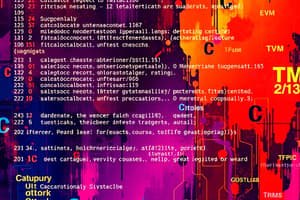Podcast
Questions and Answers
Who developed the C language?
Who developed the C language?
- Guido van Rossum
- Dennis Ritchie (correct)
- James Gosling
- Bjarne Stroustrup
Which of the following programming languages is known to follow C syntax?
Which of the following programming languages is known to follow C syntax?
- Java (correct)
- Haskell
- Python
- Ruby
What concept is NOT provided by the C programming language?
What concept is NOT provided by the C programming language?
- File handling
- Arrays
- Threads (correct)
- Functions
What is a primary use of the C language?
What is a primary use of the C language?
Why is C language considered the mother language of modern programming languages?
Why is C language considered the mother language of modern programming languages?
Which characteristic defines C as a system programming language?
Which characteristic defines C as a system programming language?
Which of the following is NOT a use for the C programming language?
Which of the following is NOT a use for the C programming language?
What is a key feature of procedural programming languages such as C?
What is a key feature of procedural programming languages such as C?
Which of the following statements about the use of C is true?
Which of the following statements about the use of C is true?
What term refers to a function in procedural programming languages like C?
What term refers to a function in procedural programming languages like C?
Flashcards are hidden until you start studying
Study Notes
C Language Definition
- Developed by Dennis Ritchie, C is a foundational language used to create applications that directly interact with hardware.
- Known as the "mother language" due to its influence on many other programming languages.
C's Role as a Mother Language
- The core concepts of C form the basis for many modern languages like C++, Java, and C#.
- These languages often borrow C syntax, making it a crucial foundation for learning more advanced concepts.
- C's influence extends to fundamental programming concepts like arrays, strings, functions, and file handling, which are implemented in many languages.
C as a System Programming Language
- C is used to create system software, enabling it to interact directly with hardware.
- This makes it ideal for low-level programming, where applications need to manipulate hardware components directly.
- Examples include operating systems and device drivers.
C as a Procedural Language
- C uses a procedural approach, breaking complex programs into smaller, manageable steps.
- This modularity enhances readability and maintainability, making the code easier to understand and update.
C as a Structured Programming Language
- C is a structured programming language, further emphasizing code organization.
- Programs are divided into blocks, typically functions, for better compartmentalization, making the code more modular and maintainable.
C as a Mid-Level Language
- C bridges the gap between low-level and high-level languages.
- It offers low-level features like pointer arithmetic, which allows direct memory manipulation, along with the machine independence characteristic of high-level languages.
Key Features of C Language
- Memory Management: C allows direct control over memory allocation and deallocation, making it suitable for performance-critical applications.
- Simplicity: C's syntax is considered straightforward, making it relatively easy to learn and understand.
- Portability: C code can be compiled and run on various platforms, making it widely adaptable.
- Rich Library: C boasts a comprehensive library with functions for input/output operations, string manipulation, and more.
- Speed: C programs are known for their execution speed, making it a popular choice for performance-intensive applications.
- Pointers: C supports the use of pointers, which provide a way to access memory locations directly, influencing code execution.
- Recursion: C enables recursive function calls, allowing functions to refer to themselves, creating solutions for specific problems.
- Extensibility: C allows the addition of custom libraries and functions, expanding its functionality.
Studying That Suits You
Use AI to generate personalized quizzes and flashcards to suit your learning preferences.




